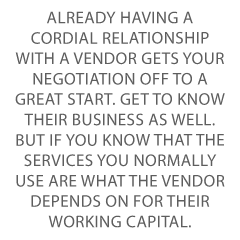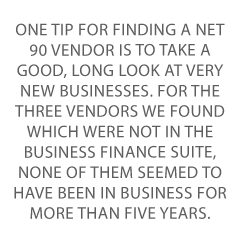What are net 90 vendors? Apart from the number, how do they differ from a net 30 account? Is one better than the other? And…how do you get them?
Net 90 means you have three months to pay back a business credit card balance or invoice. Not everyone will qualify for these terms.
What Are Net 90 Vendor Accounts?
With a net 90 vendors, the number just refers to the specifics of the vendor’s terms. With a net 30 account, the payment term is 30 days before your account is delinquent. With a net 90 account, that period is extended to 90 days.
Having three whole months to pay back a vendor makes for very generous terms. As a result, a true net 90 vendor is likely to be out of reach for a startup.
Similarly, a business owner with bad credit will have trouble getting any net 90 accounts, unless they can demonstrate healthy cash flow and their business has a good credit score.
Offering net 90 terms can cause a cash flow problem for a vendor, which doesn’t happen with prompt payment. As a result, they will check your credit carefully before granting you these terms. This is likely to result in a hard credit pull by them on your personal credit.
To be more likely to get approval for a net 90 account, it may help to have trade references to offer, perhaps from trade credit.
If you have been working with Credit Suite to build business credit, there are net 30 vendors which also want to see trade references. You can use the same references for vendor credit here, too.
Net 90 can refer to credit card or invoice payment terms. A net 90 vendor may offer an early payment discount. After all, they have bills to pay, too.
Are Net 90 Vendors Hard To Find?
Yes! For every net 30 accounts, you will have fewer than one-tenth as many net 90 accounts. They are far more difficult to qualify for than a standard net 30 account.
It also may not pay for a supplier to tell everyone that they offer such payment terms. A longer payment term for an invoice means that any late payment is already stretching into the next quarter. This can negatively affect a vendor’s cash flow.
There are also some vendors where you may be able to negotiate these kinds of payment terms. But you will likely have to have been a customer of theirs for a while, with a good business credit report.
If your small business has a good on-time payment history, a vendor will want to keep you. Which may mean they would be willing to extend net 90 invoice terms.
Anyone looking to build business credit fast is not likely to run into these sorts of vendors until they are a lot further along in their business credit-building journey.
One tip for finding a net 90 vendor is to take a good, long look at very new businesses. For the three vendors, we found which were not in the Business Finance Suite, none of them seemed to have been in business for more than five years.
Net 90 Vendors
We found two vendors in our Business Finance Suite which offer net 30, 60, or 90 credit terms. So keep in mind, even if you are able to get a credit card through them, you are more likely to start off with more like net 30 payment terms.
We found another three through some creative Googling.
You may need to prove yourself for a while before you can get the term that you really want.
Vendor 1 – Lenovo
Lenovo sells electronics such as servers, smart devices, phones, PCs, tablets, and more. They report to Experian Business and the Paynet business credit bureau. No personal guarantee is required! You can also get financing or leasing through them.
With no PG, they will not pull your personal credit to check your creditworthiness. Instead, they will judge your application based on your business credit.
To qualify, you will need a Fundability Foundation™ and a good business credit history, with at least two years in business. This means having an IRS EIN, a bank account, and all necessary business licenses.
Your business address must match everywhere, and that includes on the D&B website, even though they don’t report to Dun & Bradstreet.
Your business must have at least 20 employees and its own business website. It is highly unlikely that a startup or a side hustle would be able to meet Lenovo’s requirements for net 90.
Net terms will go through Behalf Financing.
Vendor 2 – Dell
Dell sells computers and accessories for a home or a small, medium, or large business. A Dell Business Credit account is a revolving line of credit for financing the purchase of Dell equipment.
They report to Dun & Bradstreet every quarter. Get net 30, 60, 90, or revolving payment terms. There is no personal guarantee necessary.
Because Dell will not be pulling your consumer credit, they are going to rely on your business and your business credit score when determining if they will approve you.
To qualify, you will need a Fundability™ Foundation and must be in business for at least two years. To avoid a denial due to perceived fraud, your business address must match everywhere. In particular, it should match the Secretary of State and IRS records.
This means your business must have an EIN number from the IRS and be in good standing with the applicable Secretary of State.
You must have a D-U-N-S number. The business address will also have to match on the D&B website. Your business must have a good D&B PAYDEX business credit score of 80 or better.
Vendor 3 – Obey Business
Obey Business offers marketing materials and services. They offer a subscription business trade account (their Business Credit Lifter plan) with a net 30 term, net 60, or net 90 terms.
Obey reports to Dun & Bradstreet, Experian, Equifax Business, Innovis, and CreditSafe.
Their net 90 plan costs $98 per month and they recommend it for corporations, LLCs, and nonprofits looking to add Tier 3 business credit vendors. This is an actual tradeline.
The net 90 plan includes a $15,000 tradeline with access to their preferred funding partners.
The only difference among the plans, apart from the payment terms, is their monthly costs and the size of the tradeline. Net 30 terms are $48 per month and come with a $5,000 tradeline. The net 60 plan is $68 per month with a $10,000 tradeline.
You must be in business for at least 90 days with a positive credit rating to qualify.
Vendor 4 – Mobile Welder
Mobile Welder is admittedly a truly niche vendor. Located in Senoia, Georgia, which is about 40 miles south of Atlanta. The company services parts of both Georgia and Alabama.
Mobile Welder does exactly what the name says—it’s a welding service that will travel, welding together everything from broken metal staircases to restaurant gas ranges.
They offer net 30, net 60, and net 90 terms, at varying pricing schedules. The only difference among these terms, apart from the amount of time to pay, is the labor rate.
Net 30 vendor terms are billed at emergency rates, currently $200 per hour. Net 60 is billed at three times the scheduled rate. But I could not locate the scheduled rate, although it should be less than the emergency rate.
Net 90 is billed at five times the scheduled rate. The company also offers discounted additional labor rates for various reasons, such as booking in advance.
How to Negotiate Net 90 Terms
Like with any other negotiation, you want to have room to move and approach it from a position of strength and nonurgency.
Already having a cordial relationship with a vendor gets your negotiation off to a great start. Get to know their business as well. But if you know that the services you normally use are what the vendor depends on for their working capital, you probably can’t get net 90.
But if the services you use are loss leaders, a vendor may be more flexible. Either way, the proposal must be mutually beneficial.
It will also help if you have access to alternative vendors. A bespoke vendor can probably dictate their own terms. But a vendor selling computers is competing with, among others, Amazon. They may be willing to go the extra mile to keep you.
Be honest and reasonable. And recognize you may not get the exact terms you want the first time around. But that doesn’t mean you can’t try again later.
Takeaways
Net 90 is out there, and it is possible to get these sorts of terms. But they can be hard to come by. If the tables were turned, would you want to have to wait three months for payments?
This is precisely the situation some freelancers find themselves in—but they have to take or leave what they get. You don’t.




